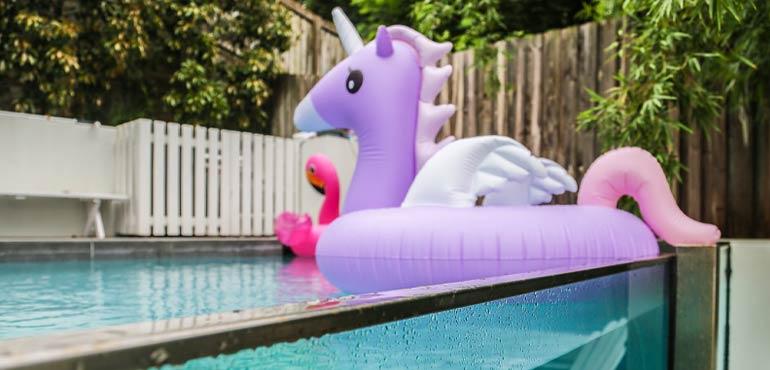
- Home
- Your property
- Swimming pools
- Buy, sell or lease property with pool
Buy, sell or lease a property with a pool
If you are buying, selling or leasing a property with a pool you must get a pool safety certificate if there is not a current certificate in place. The rules depend on whether the pool is non-shared or shared.
Non-shared pools
You can buy or sell your property with a non-shared pool with or without a pool safety certificate. If you are leasing the property, a pool safety certificate must be in place before the lease is signed.
You can search our swimming pool register for a property and view details of the most recent pool safety certificate if one has been issued.
You can sell your property with or without a pool safety certificate.
With a pool safety certificate
If selling with a current pool safety certificate, you must give the buyer a copy before settlement. Safety certificates are valid for 2 years for non-shared pools. You don't need to get a new one before each sale.
You can access a copy of the certificate on the pool register.
Without a pool safety certificate
When selling without a pool safety certificate, fill out a Form 36—notice of no pool safety certificate (PDF 137.99KB). This form will help prospective buyers make a more informed decision about purchasing the property.
Ordinarily a Form 36 will be completed as part of the contract of sale. Before settlement you must give a copy to:
- the buyer; and
- the QBCC.
If you buy a property without a pool safety certificate you must get one within 90 days of settlement.
If you want to lease your home with a non-shared pool you must obtain a pool safety certificate.
Shared pools
It is the pool owner's job to obtain safety certificates for shared pools. This is usually the body corporate.
They must share the certificate with individual owners.
You can sell your property with a shared pool with or without a pool safety certificate.
With a pool safety certificate
If selling with a pool safety certificate, you must give the buyer a copy before settlement. Safety certificates are valid for 1 year for shared pools. You don't need to get a new one before each sale.
You can access a copy of the certificate on the pool register.
Without a pool safety certificate
If you are selling your home, unit or townhouse that has a shared pool, you must fill out a Form 36—notice of no pool safety certificate (PDF 137.99KB).
Before settlement you must give a copy of the form 36 to:
- the buyer
- the owner of the pool (usually a body corporate)
- the QBCC.
The owner of the pool (usually the body corporate) must obtain a pool safety certificate within 90 days of settlement.
If you buy a property with a shared pool without a pool safety certificate the pool owner (usually the body corporate) must get one and provide you a copy of it within 90 days of settlement.
If your property has a manager they are responsible for keeping the pool safe and ensuring tenants and owners understand the pool safety laws.
More information for property agents and property managers:
You can lease out your property that has a shared pool with or without a pool safety certificate.
With a pool safety certificate
If leasing a property with a pool safety certificate, you must give a copy to:
- the new occupier
- the owner of the pool (usually a body corporate).
You can access a copy of the certificate on the pool register.
Without a pool safety certificate
Fill out a Form 36—notice of no pool safety certificate (PDF 137.99KB).
Give a copy to:
- the new occupier
- the owner of the pool (usually a body corporate)
- the QBCC.
The owner of the pool (usually the body corporate) then has 90 days to obtain a pool safety certificate.
Selling at auction
If a property with a pool is being sold at auction and there is no current no pool safety certificate, the owner or their agent (e.g. auctioneer, real estate agent etc.) must give prospective buyers a copy of the Form 36—notice of no pool safety certificate (PDF 137.99KB) before entering into a contract of sale.
How to lodge form
Send your swimming pool forms to the swimming pools team:
- by email: poolsafety@qbcc.qld.gov.au
- in person at a QBCC service centre
- by mail.
Maintain safety standards
If you own a pool you are responsible for making sure the fence complies with the pool safety standard, even if you have a Form 36 to say your pool does not have a safety certificate.
Your local council can fine you if your pool fence does not comply with the standard, even if you have you have a certificate. It is the pool owner's responsibility to ensure their pool fence is compliant.
